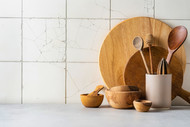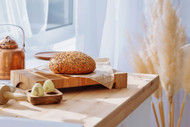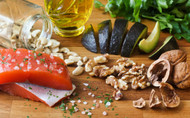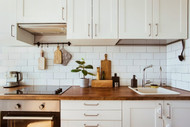
What Is Butcher Block?
May 26th 2022
Original butcher's blocks were made from the tough end grain of maple logs and other hardwoods. Known for its patchwork appearance, "butcher block" has become ubiquitous in modern kitchens. But, have you ever wondered how such a traditional, unadorned piece of butcher's equipment made its way into millions of American homes?
In this article we share the history of butcher block and why it has become such a beloved kitchen staple.
The History of Butcher Block
Despite what its name implies, butcher block was first used by blacksmiths. The thick wood absorbed the smith's heavy blows and was so durable that he could use the same block for his entire career.
In 1887, Conrad Boos fashioned a block for the local blacksmith. Soon afterwards, the local butcher noticed how well it held up and requested a block for himself. It caught on so much that Conrad's son John sold "Boos butcher blocks" in his region.
In the middle of the twentieth-century, cutting large quantities of meat became the work of machines. To adapt to this change, the block shrunk with the cuts of meat to become the household item we know today.
Overtime, as local butcher shops became less common and fewer people carve meat at home, the smaller butcher blocks were again repurposed. Thrifty homeowners with an eye for unique designs, started to use them as small countertops or even tabletops.
Gradually, they became less "blocky" and the traditional end grain butcher block construction was adapted into a more standard countertop style.
Butcher Block’s Modern Use As Countertops
Butcher block's rise in use for everyday cooking is due to two factors.
First, butcher block offers several advantages over other types of countertops, like granite. Granite is difficult to install because it's so heavy. It's also more expensive. Butcher block is an affordable and often practical option that still offers a beautiful surface a step up from laminate or other more common materials.
Secondly, as the trend of sharing pictures of cooking on social media has spread, home cooks want beautiful kitchens now more than ever. Butcher block countertops offer homeowners a beautiful, natural wood surface to safely prepare and serve meals. Depending on the style of butcher block countertop construction, the wood grain is made particularly visible, resulting in a range of unique kitchen aesthetics.
The Benefits of Butcher Block
Butcher block countertops have several other advantages. When treated properly, wood is waterproof, which means cooks can cut food directly on its surface.
Wood is easier on knives than granite or plastic, so using butcher block countertops and cutting boards also preserves your knives.
Finally, sustainably sourced lumber is a great choice for the environmentally conscious consumer.
If you want to renovate your kitchen to have wood accents or a rustic flair, consider Hardwood Lumber Company's butcher block countertops. Custom made and handcrafted, our products continue Conrad Boos's tradition of providing our neighbors with quality goods. Shop our website to discover what butcher block can offer you.





